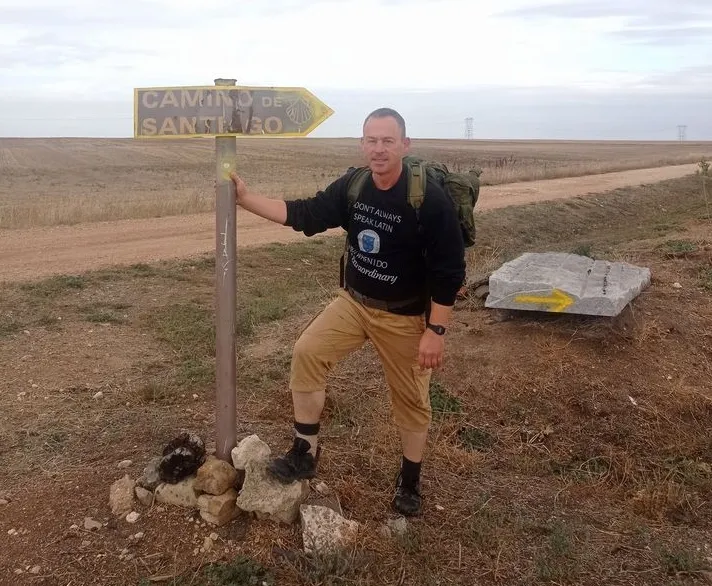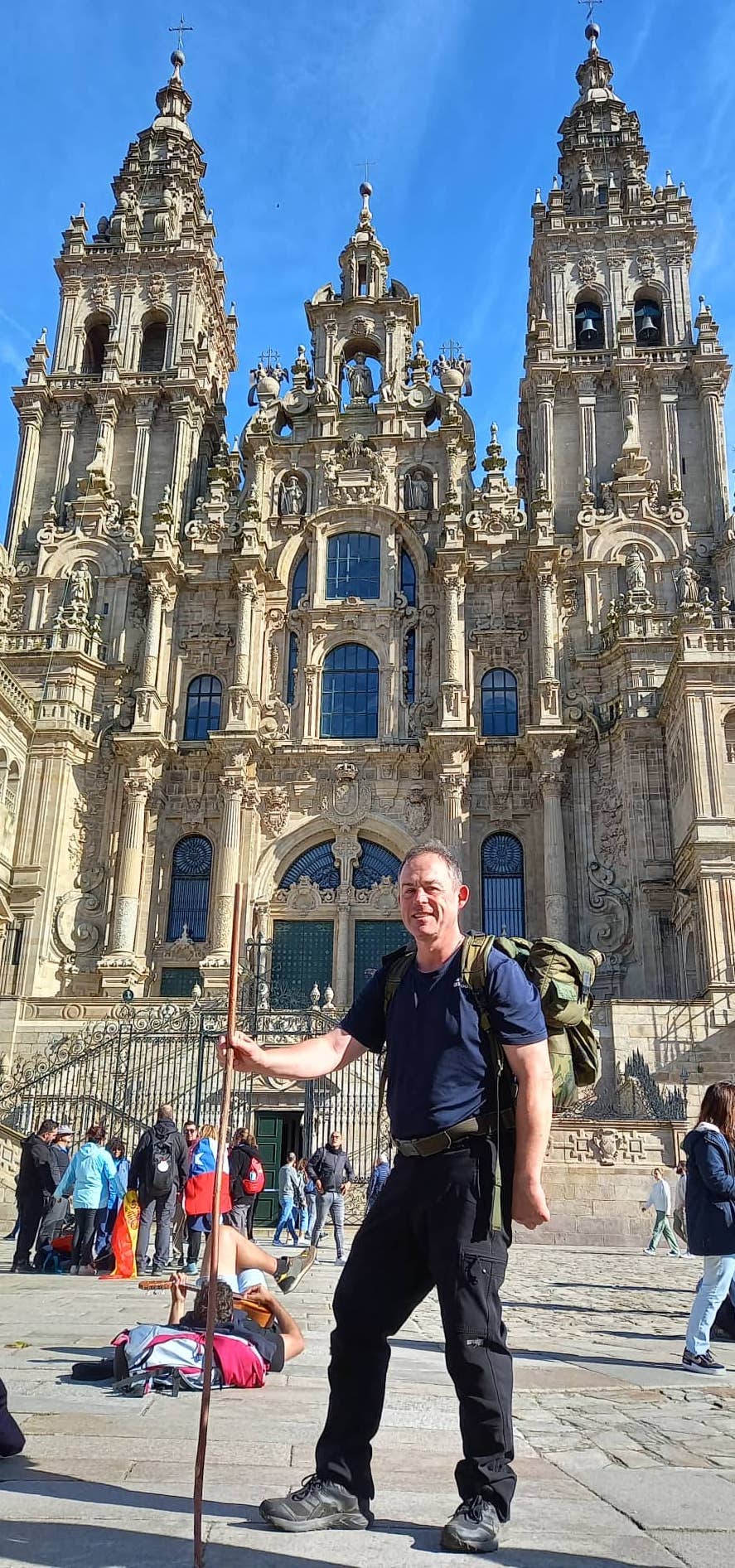Northern Michigan University 1997 history alumnus Philip Webb completed Spain's famous pilgrimage trail, El Camino de Santiago—also known as “The Way”—walking 621 miles over 38 days on the longest, most arduous route. The UNESCO-listed trail originated in medieval times, when pilgrims made a spiritual journey to the Cathedral of Santiago de Compostela to visit the reported tomb of the Apostle Saint James. Now more than 300,000 people from all over the world traverse it each year for a variety of reasons. Webb's pilgrimage was fueled by a desire to deepen his Catholic faith, engage in self-reflection and raise money for a charitable cause.
Webb is a retired machinist. He and his wife, Maria, and their daughter, Elena, recently moved from Michigan to Spain. Because their new home in Maria's hometown of Sanlucar de Barrameda is in close proximity to the Camino, Webb decided this would be the year to fulfill his dream of walking the trail.
The Marine veteran carried a combat rosary on his journey. He had planned to complete his hike on Nov. 10, the 247th birthday of the U.S. Marine Corps. Webb finished two days ahead of schedule because a lack of accommodation in several cities forced him to do double stages of 26-30 miles per day early on.
“With all of the difficulties in lodging, I appreciate the Holy Family finding no room at the inn during the birth of our Lord,” said Webb in retrospect. “What do you really need in life if you can live out of a backpack for six weeks? The simplicity has an honesty to it. Traveling over 600 miles on foot also gives you a different perspective on time and distance.
“I believe that attempting difficult tasks helps to develop your own potential. The Camino gradually consumes you to the point where there is only the immediate present, what many pilgrims refer to as living in the ‘now,' and you are forced to get out of your own way. I believe that many people are dissatisfied with their lives because they lack goals. On the Camino, each stage is a goal, each completion a victory, and there is always an ultimate destination in mind. Despite the pain, hardships, fatigue and bad weather, nearly every pilgrim I met was upbeat.”
The Camino has become massively popular for those seeking spiritual affirmation, self-reflection, an exploration of history and culture, a digital detox while connecting with nature, or a fitness challenge. People tackle segments or complete a single thru-hike along the vast network of roads and paths that lead to the Cathedral of Santiago de Compostela in Galicia, in northwest Spain. Webb traveled the Via de la Plata, also known as the “Silver Way” route. He said it is the least traveled, with only about 4,080 people completing it last year. It is also well-known for its natural landscapes, charming villages and ancient history.
Webb began his journey in Seville with temps in the mid-90s and weathered days near the end that were in the high 30s with rain. Challenges along the way included early portions of trail that were poorly marked, as well as multiple mountain ascents and descents over long daily distances with few facilities in between.
“The final morning's walk was a strange mix of excitement and melancholy,” he said. “I had spent the previous 10 days traveling with some incredible newfound friends, known as a Camino family, and knew I'd never see them again. I was also fortunate to walk the final 200 kilometers with a Galician local who became my personal travel guide and best friend. She knew the culture and cuisine, and had friends and family in every small mountain village. She purposely misled me on my entry point to the plaza so she could surprise me by turning me around in front of the cathedral.
“There are no words to describe seeing your goal after 38 difficult days and not expecting it in that moment. Then, two minutes later, a friend from 28 days before tracked me down. He had finished a day earlier and waited around so he could congratulate me. Witnessing humanity at its best is both powerful and uplifting.”
NMU alumna Caytie Maurer, who holds a master of arts degree in English writing and literature, helped to publicize Webb's Camino quest and his associated effort to raise money for a Fraternitas Sacerdotalis Sancti Petri (FSSP) mission located alongside a rural school in the mountains outside Bogota, Colombia. The FSSP is a traditionalist Catholic society of apostolic life dedicated to providing a foundation in the church's ancient Roman liturgy to its priests and seminarians to serve Catholic parishes around the world.
"My family loves attending the traditional Latin Mass in Jerez, Spain — especially my daughter, who has expressed a desire to help poor children since she was 4 years old,” Webb said. “My upbringing in a rural school integrated agriculture into education, so I value the focus on agriculture that the FSSP provides to rural families outside of Bogota. And as a Marine deployed in Central America during the Panama invasion and subsequent counter-narcotics missions in the early 1990s, I recognized the need for moral development in children to combat narco-culture.”
Webb said other pilgrims claim The Way is addictive. He is beginning to plan another, “lower-key” journey next year on the Camino del Norte, which is the second-most difficult route. He posted regular social media updates and photos on this year's trek, which are still viewable on Facebook here or by searching for Phil's Camino.


